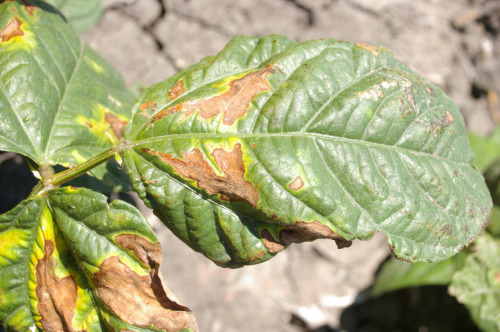Given the expected value of mungbean this season it may be well worth investing in new seed through the AMA Seed Scheme—look for the well-marked bags available from your seed retailer.
Why support the AMA Seed Scheme
by Paul McIntosh, Pulse Australia
At planting time I am often reminded of my father Alec saying that the cheapest input into our family farming operation was good quality planting seed. He had experienced the disappointing results of soybean planting seed that proved to have poor germination percentage, combined with a lack of vigour, even though the seed had been stored under cool conditions.
There is no doubt that a good crop starts with quality seed where varietal purity, high vigour and good germination are assured. One particular risk in mungbean is the potential for bacterial diseases such as halo blight and tan spot to carryover to the new crop via infected seed. To minimise this risk the Australian Mungbean Association established a seed scheme that provides the industry with high quality, low risk seed for planting. The recommended practice is for growers to replenish their plant seed every third or fourth season with new AMA approved seed.
In 2005 the AMA commenced the seed production scheme where an independent third party inspects seed production crops for any signs of bacterial diseases, like halo blight and tan spot, along with various other diseases and weed contaminants. This process reduces the incidence of disease and gives the industry confidence in the integrity of the seed supply.
With the returns from mungbean expected to be high again this season it is well worth investing in quality assured seed. Only retain and use your own mungbean seed from crops that did not have any sign of tan spot or halo blight last season – if in doubt, don’t use it and purchase fresh seed.
While purchasing seed through the scheme does not guarantee a disease-free crop it certainly reduces the risk, we often see outbreaks of these diseases more commonly in crops grown from multiple generation grower-retained seed where the level of seed borne pathogens has had opportunity to build up.
 Mungbean leaves showing symptoms typical of tan spot disease.
Mungbean leaves showing symptoms typical of tan spot disease.
Although these are seed-borne diseases, they are also hosted in weeds such as cow vine and bellvine that can be present in summer cropping systems where the disease can be transferred to the crop via rain-splash. Once infection occurs there is no treatment available for the infected crop and the extent of damage will depend completely on the prevailing seasonal conditions.
The AMA is to be applauded for the highly rigourous seed scheme. In addition to the third-party inspections of the seed crops, the scheme involves contracting experienced growers who use their own machinery, a good crop rotation, optimum nutrition and excellent weed control. Although this adds to the cost of the seed, this pales into insignificance compared to a disappointing result where the full yield potential was not realised due to poor quality seed.
In addition to acquiring good clean seed lines with known germinations and vigour, be sure to look after the seed and not drop bags of seed, small or bulk, from any height. The heavy impact onto truck floors or cement aprons is asking for trouble, with seed potentially splitting or invisible crack lines forming.
The industry best practice is that mungbean producers replenish their seed lines at least every three to four years. If in doubt, replacing seed will cost far less than the potential yield losses, so contact your local seed retailer now to arrange purchase of clean seed for this season. Seed produced under the AMA scheme is sold in clearly branded bags with each seed lot fully traceable back to the paddock of production.
Samples requested
The recent wet and stormy weather in many locations has encouraged bacterial and fungal diseases in a number of spring planted mungbean crops. To assist the plant breeding progam, DAF Qld plant pathologist Lisa Kelly is asking for plant samples to be sent for diagnosis and to help determine which races of the pathogens, particularly halo blight, are dominating commercial crops. Even if diagnosis is not required please send fresh plant specimens from suspect and infected plants in a paper bag to: Lisa Kelly, DAF, 203 Tor Street, Toowoomba QLD 4350. Please contact Lisa prior to sending samples: email lisa.kelly@daf.qld.gov.au or call 07 46881590 or 0477 747 040.
For more information contact Paul McIntosh, Pulse Australia Industry Development Manager (Northern) P: 0429 566 198 E: paul@pulseaus.com.au
Pulse Australia: www.pulseaus.com.au
Follow us on Twitter @Pulse_Australia

